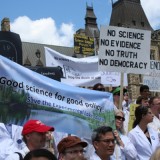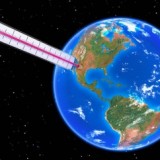Machiavelli would approve. So would Stalin, Mao Zedong, the ayatollahs of Iran, Robert Mugabe of Zimbabwe and Bashar al-Assad of Syria. George Orwell would proudly place the audacity of information control in the Ministry of Truth, the agency in his dystopian 1984 novel in which Big Brother uses the Thought Police as the instrument that determines right from wrong, good from bad, wise from foolish, fact from fiction, reality from illusion.
Reality is shaped by information. Control information and reality is controlled. Eliminate information and the blank slate of public consciousness is vulnerable to suggestion and manipulation. Reality is, in effect, an immensely valuable but incredibly fragile commodity, forever changing as information changes. Little wonder, then, that those with a special interest in power also have a special interest in controlling information.
This would be an academic subject befitting a university class on ethics, philosophy or politics if it were not surfacing in Canada because of the Privy Council’s muzzling of scientists associated with the federal government through employment or grants. The strictures on what scientists can publicly say or publish, put in place by the Prime Minister’s office, have been tightening in recent years. In 2011 scientists protested and collectively complained that they could not speak openly to Canadians about their research and findings without receiving prior approval from the upper echelons of government—a dramatic break from the traditional freedom that is an assumed liberty in an open, modern and democratic society. Now the strictures are tightening further.
“As of February 1st this year,” writes Elizabeth May in Island Tides, (Feb. 28/13), “new rules were put in place requiring that scientists working on projects in conjunction with DFO in the Central and Arctic Region to treat all information as proprietary to DFO and — worse — await departmental approval before submitting research to any scientific journals.” A week later, on February 7th, additional rules were imposed requiring that “now they must obtain prior consent before applying for research grants” (Ibid.).
In Elizabeth May’s assessment of the tightening controls on scientists and their research, the process and its intent is obvious. “The tightening of control over science must be established far earlier in the process. Stop research from being submitted to journals. Stop scientists from collaborating with others. Stop scientists from applying for research grants. Stop science from happening at all” (Ibid.). This tragedy is compounded by strictures that constrain scientists from complaining about the constraints placed on them.
An American scientist, Dr. Andrew Muenchow, who has been doing important collaborative research with DFO in the Eastern Arctic since 2003, has refused to accept the new conditions, politely calling them a “potential muzzle”. The dissemination of crucially important information from Dr. Kristi Miller on viral diseases arriving in Canadian waters from salmon farming has been obstructed by the government authorities. Scientists researching ozone depletion, Arctic ice melt, pollution and species loss have been silenced. These are typical examples of the control of information by the Privy Council, an adjunct of the Prime Minister’s office. And it contrasts dramatically with the earlier protocol in which, “Data and any other project-related information shall be freely available to all Parties to this Agreement and may be disseminated or published at any time” (Ibid.). The Iron Curtain and the Berlin Wall have appeared in Canada as a blackout on any scientific studies that may conflict with the direction of government’s agenda.
This is not a mere scientific issue. Although science should be the basis upon which governments make many important legislative and policy decisions, open and free scientific research is the most obvious measure of an open and free society, one in which evidence is given precedence over ideology, and decisions are weighted and made as rationally and intelligently as possible from the best available information. Control information and decisions can be shifted toward ideology, the unexamined opinions that drift away from enlightened guidance toward blind bigotry.
Granted, governments make decisions and devise legislation based on their particular ideological bent. But this ideology must be guided by credible information. And a substantial portion of this information now comes from scientific research, collaboration, study and findings. Opinion untempered and unguided by science lacks credibility because it isn’t connected to an empirical measure of circumstances. Ideology that is untested and incompatible with evidence is medieval, for it bears little relationship to reality. Government strategy and legislation founded on uninformed opinion will invariably be flawed and dysfunctional. Even worse, the result is a burden of liabilities, faulty strategies, defective laws and missed opportunities that can be incredibly costly to a country, to its citizens and to the environment that sustains them.
The laws of science don’t change to suit political and economic agendas. Pretending that greenhouse gas emissions are not changing weather, that the Arctic is not warming, that pollutants don’t harm ecologies, and that crucial ecosystems are not under threat is denial bordering on the delusional and pathological. Scientists don’t invent what is happening to our world; they measure, witness and report to us. Muzzling their effort silences evidence and increases our vulnerability to environmental ruin.
As Elizabeth May so eloquently concludes, this suppression of the free exchange of scientific information in Canada “is the 21st Century equivalent of the Dark Ages. This is book burning and superstition run rampant. This is the administration of a steady, slow drip of poison to a weakening democracy” (Ibid.).



